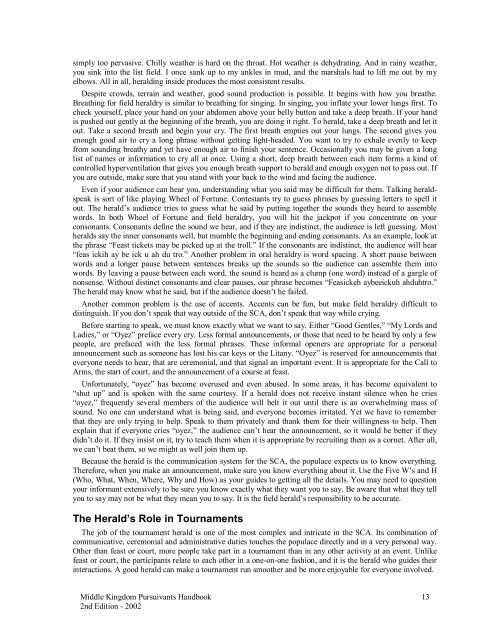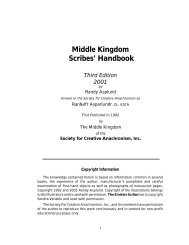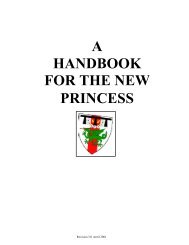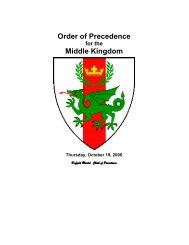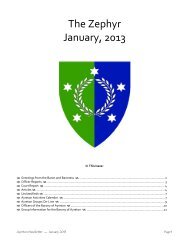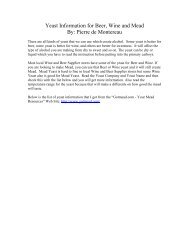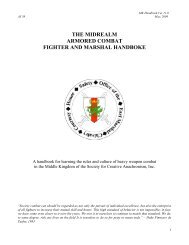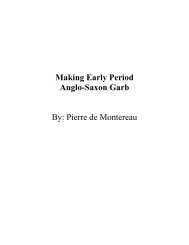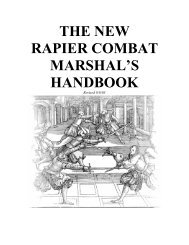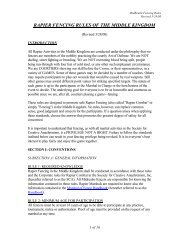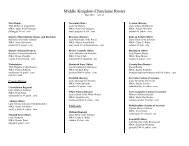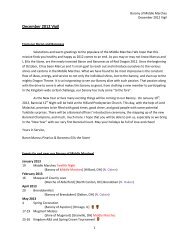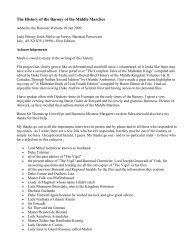The herald who is on duty should behave with the dignity of the office. Shopping, eating and fighting are offduty activities. As a herald, you represent the Crown. Please be an example of courtesy. The medieval heraldwas supposed to be neutral and immune to attack. As a sign of this, the SCA herald bears no weapons: Swords,battle-axes, bows, period fire arms, etc. are improper accessories to the well-dressed herald. Small daggers, ifsheathed and peace bonded, are not considered weapons but rather tools and as such are acceptable.So now you look like a herald. Yet feeling good is even more important than looking good. If you are sick,particularly if you have a sore throat, do not field herald! You will make yourself sicker while doing a poor job.Even if healthy, it is wise to prepare yourself. Some heralds cry better after eating; some cry better whenhungry. If you need food, be sure it is available. All heralds should drink fluids. A dry throat not only producespoor sound, it produces painful sound. If you will be working outside, prepare for the environment. Have a hatand sunscreen for those hot July tourneys, and wear comfortable clothing. Most periods of clothing are okay toherald in. Only those that prevent the expansion of the lungs, like Tudor bodices and cotehardies, are a problem.You will probably be on your feet a lot, so good shoes are the final requirement.Once you look like a herald and feel like a herald, you have to begin to sound like a herald. Some individualshave naturally booming voices. Through practice and proper technique, however, any voice can become a goodfield heraldry voice. Learning to use what you have is what counts.Where the field herald stands when he speaks affects how well he is heard. Voices bounce. Thus the fieldherald has to position in a room so as to bounce his voice across the most people. Most field heraldry during theday takes place around a tourney field, so let’s look at the possibilities (figure 1).In terms of sound, arrangement A will be the best for the herald. By standing with your back to corner 1,facing corner 2, your voice will cover most people. In B, face the opposite wall before you cry. The people inthe corners may not hear you, but you still cover the majority. Arrangement C is the worst possible one for thefield herald. No single cry will cover everyone. Therefore, you must cry twice, one each in opposite directions.The challenge to indoor heraldry is to cry over the noise of the populace. Their noise will be filling the samespace your cry must fill. Low ceilings and bunker-style architecture make it worse.Indoor field heraldry, for all its complexity, is not as challenging as outdoor field heraldry. The pursuivantcrying outdoors fights terrain and environment. Yet they too can be friend instead of foe, if used correctly. Nomatter how loud you are, you cannot force the populace to listen to you. What you can do is use tricks to standout from the crowd—literally! Stand on the highest point you can find. Stand on a hill, a picnic table, even just asmall mound of dirt: if you are taller than everyone else, your audience can see where all that sound is comingfrom, and that it is directed towards them. If directed towards them, they must need to hear it, right? So they payattention. Having your audience look up to you also gives you an illusion of authority, so that they are morelikely to be quiet when you cry. Standing on the slope of a hill has a second advantage—the hill forms abackdrop to your voice. Hills serve the same function walls do inside a building. They channel the audience intogroups (in the valleys) and they form barriers for sound to bounce off. It is easier to cry in a hilly area than a flatplain. The Pennsic Field Battle is the classic herald’s nightmare. With no architecture to bounce and concentrateyour sound it just drifts away. Not only is your sound dispersed, so is your audience. The herald in a meadowmust cover a larger area with less sound. Because of this, heraldry in the flatlands requires significantly moreeffort.Wind and weather may conspire against the field herald, too. A heavy breeze is difficult to cry over. It is12 <strong>Middle</strong> <strong>Kingdom</strong> <strong>Pursuivants</strong> <strong>Handbook</strong><strong>2nd</strong> <strong>Edition</strong> - 2002
simply too pervasive. Chilly weather is hard on the throat. Hot weather is dehydrating. And in rainy weather,you sink into the list field. I once sank up to my ankles in mud, and the marshals had to lift me out by myelbows. All in all, heralding inside produces the most consistent results.Despite crowds, terrain and weather, good sound production is possible. It begins with how you breathe.Breathing for field heraldry is similar to breathing for singing. In singing, you inflate your lower lungs first. Tocheck yourself, place your hand on your abdomen above your belly button and take a deep breath. If your handis pushed out gently at the beginning of the breath, you are doing it right. To herald, take a deep breath and let itout. Take a second breath and begin your cry. The first breath empties out your lungs. The second gives youenough good air to cry a long phrase without getting light-headed. You want to try to exhale evenly to keepfrom sounding breathy and yet have enough air to finish your sentence. Occasionally you may be given a longlist of names or information to cry all at once. Using a short, deep breath between each item forms a kind ofcontrolled hyperventilation that gives you enough breath support to herald and enough oxygen not to pass out. Ifyou are outside, make sure that you stand with your back to the wind and facing the audience.Even if your audience can hear you, understanding what you said may be difficult for them. Talking heraldspeakis sort of like playing Wheel of Fortune. Contestants try to guess phrases by guessing letters to spell itout. The herald’s audience tries to guess what he said by putting together the sounds they heard to assemblewords. In both Wheel of Fortune and field heraldry, you will hit the jackpot if you concentrate on yourconsonants. Consonants define the sound we hear, and if they are indistinct, the audience is left guessing. Mostheralds say the inner consonants well, but mumble the beginning and ending consonants. As an example, look atthe phrase “Feast tickets may be picked up at the troll.” If the consonants are indistinct, the audience will hear“feas ickih ay be ick u ah du tro.” Another problem in oral heraldry is word spacing. A short pause betweenwords and a longer pause between sentences breaks up the sounds so the audience can assemble them intowords. By leaving a pause between each word, the sound is heard as a clump (one word) instead of a gargle ofnonsense. Without distinct consonants and clear pauses, our phrase becomes “Feasickeh aybeeickuh ahduhtro.”The herald may know what he said, but if the audience doesn’t he failed.Another common problem is the use of accents. Accents can be fun, but make field heraldry difficult todistinguish. If you don’t speak that way outside of the SCA, don’t speak that way while crying.Before starting to speak, we must know exactly what we want to say. Either “Good Gentles,” “My Lords andLadies,” or “Oyez” preface every cry. Less formal announcements, or those that need to be heard by only a fewpeople, are prefaced with the less formal phrases. These informal openers are appropriate for a personalannouncement such as someone has lost his car keys or the Litany. “Oyez” is reserved for announcements thateveryone needs to hear, that are ceremonial, and that signal an important event. It is appropriate for the Call toArms, the start of court, and the announcement of a course at feast.Unfortunately, “oyez” has become overused and even abused. In some areas, it has become equivalent to“shut up” and is spoken with the same courtesy. If a herald does not receive instant silence when he cries“oyez,” frequently several members of the audience will belt it out until there is an overwhelming mass ofsound. No one can understand what is being said, and everyone becomes irritated. Yet we have to rememberthat they are only trying to help. Speak to them privately and thank them for their willingness to help. Thenexplain that if everyone cries “oyez,” the audience can’t hear the announcement, so it would be better if theydidn’t do it. If they insist on it, try to teach them when it is appropriate by recruiting them as a cornet. After all,we can’t beat them, so we might as well join them up.Because the herald is the communication system for the SCA, the populace expects us to know everything.Therefore, when you make an announcement, make sure you know everything about it. Use the Five W’s and H(Who, What, When, Where, Why and How) as your guides to getting all the details. You may need to questionyour informant extensively to be sure you know exactly what they want you to say. Be aware that what they tellyou to say may not be what they mean you to say. It is the field herald’s responsibility to be accurate.The Herald’s Role in TournamentsThe job of the tournament herald is one of the most complex and intricate in the SCA. Its combination ofcommunicative, ceremonial and administrative duties touches the populace directly and in a very personal way.Other than feast or court, more people take part in a tournament than in any other activity at an event. Unlikefeast or court, the participants relate to each other in a one-on-one fashion, and it is the herald who guides theirinteractions. A good herald can make a tournament run smoother and be more enjoyable for everyone involved.<strong>Middle</strong> <strong>Kingdom</strong> <strong>Pursuivants</strong> <strong>Handbook</strong> 13<strong>2nd</strong> <strong>Edition</strong> - 2002
- Page 2: Middle Kingdom Pursuivants Handbook
- Page 5 and 6: INTRODUCTION.......................
- Page 7 and 8: Saracens: Early to Mid-Medieval Mus
- Page 9 and 10: IntroductionOsric of FayrehopeWhat
- Page 11 and 12: AcknowledgementsMistress Elena de V
- Page 13 and 14: The Middle KingdomCollege of Herald
- Page 15 and 16: Regional HeraldsConstellation Heral
- Page 17 and 18: Pursuivant DutiesDuties of the Bran
- Page 19 and 20: All submissions should be sent to t
- Page 21 and 22: What to Report?First of all, your r
- Page 23: esponsibility now. It wouldn’t hu
- Page 27 and 28: switched into the losers’ bracket
- Page 29 and 30: prevent accusations of a rigged lis
- Page 31 and 32: the green fabric), a larger spool o
- Page 33 and 34: Precedence and CourtesyCourtly Beha
- Page 35 and 36: Territorial Barons and Baronesses m
- Page 37 and 38: c. Once all presentations appear to
- Page 39 and 40: i. Oaths of Fealty and Acknowledgem
- Page 41 and 42: herald is the voice of the Crown an
- Page 43 and 44: Award of the Dragon's FlightOP Abbr
- Page 45 and 46: Award of ArmsOP Abbreviation - AoAL
- Page 47 and 48: Order of the Red CompanyOP Abbrevia
- Page 49 and 50: Order of the WillowOP Abbreviation
- Page 51 and 52: Order of the Gold MaceOP Abbreviati
- Page 53 and 54: Master of ArmsOP Abbreviation - MSC
- Page 55 and 56: Prince and Princess of NorthshieldO
- Page 57 and 58: - The Consort of Northshield bears
- Page 59 and 60: The Submission ProcessWorking with
- Page 61 and 62: A good consultant will have these e
- Page 63 and 64: submit it anyway (“I may be wrong
- Page 65 and 66: Internal Letter Of Acceptance And R
- Page 67 and 68: NamesOn Names and Name Documentatio
- Page 69 and 70: Choosing a CultureJehan de la March
- Page 71 and 72: Clothing: For the Slavic groups, pr
- Page 73 and 74: Politics: The entire Islamic world
- Page 75 and 76:
Although in the earlier Middle Ages
- Page 77 and 78:
character in Household’s Arabesqu
- Page 79 and 80:
An Extremely Brief BibliographyWest
- Page 81 and 82:
ArmoryThe Philosophical Roots of He
- Page 83 and 84:
Even if your natural instinct for a
- Page 85 and 86:
5. Peripheral secondary charges.6.
- Page 87 and 88:
Brisures (marks of cadency) and aug
- Page 89 and 90:
Still found in mundane blazons are
- Page 91 and 92:
Efficient Conflict ResearchKeridwen
- Page 93 and 94:
1. Is there a peripheral charge (a
- Page 95 and 96:
checking under the old rules, the s
- Page 97 and 98:
2. Yes, the peripheral is charged.
- Page 99 and 100:
Many authors state that dancetty is
- Page 101 and 102:
Charges may be placed on either sid
- Page 103 and 104:
It’s a bit more complicated to ke
- Page 105 and 106:
This page shows properly drawn exam
- Page 107 and 108:
This page shows a number of common
- Page 109 and 110:
Postures of Animals (cont’d)Posit
- Page 111 and 112:
Postures of BirdsPosition & Comment
- Page 113 and 114:
Postures of Fish and DolphinsPositi
- Page 115 and 116:
Barony of Caer Anterth MawrAzure, a
- Page 117 and 118:
Barony of the North WoodsAzure, a w
- Page 119 and 120:
Shire of AfonlynAzure, on a bend ar
- Page 121 and 122:
Shire of Rivenwood TowerErmine, on
- Page 123 and 124:
Reference BooksThe Basic HeraldBron
- Page 125 and 126:
Bardsley, Charles Wareing. English
- Page 127 and 128:
Kaganoff, Benzion C. A Dictionary o
- Page 129 and 130:
Sims, Clifford Stanley. The Origin
- Page 131 and 132:
Moncreiffe, Iain, and Don Pottinger
- Page 133 and 134:
Bruce Draconarius of Mistholme and
- Page 135 and 136:
Rules and RegulationsRules for Subm
- Page 137 and 138:
Although China, Random and Starhawk
- Page 139 and 140:
iii. Heraldic Titles - Heraldic tit
- Page 141 and 142:
ii. Number of Name Phrases - A pers
- Page 143 and 144:
PART VII - COMPATIBLE ARMORIAL CONT
- Page 145 and 146:
i. A metal and a color;ii. An eleme
- Page 147 and 148:
PART IX - OFFENSIVE ARMORYOffensive
- Page 149 and 150:
ii. Field-Primary Armory - If neith
- Page 151 and 152:
j. Changes to Charges on Charges -
- Page 153 and 154:
3. Marshalling. - Armory that appea
- Page 155 and 156:
directly by individuals, but may be
- Page 157 and 158:
the Laurel Office from the registra
- Page 159 and 160:
charge or augmentation is transferr
- Page 161 and 162:
so that ð is alphabetized as dh,
- Page 163 and 164:
1. Failure to Comment. Failure to c
- Page 165 and 166:
B. Content of Letters of Acceptance
- Page 167 and 168:
1. Principal Heralds - The Principa
- Page 169 and 170:
1. Financial Reports - Financial re
- Page 171 and 172:
Appendix B - Standard Designations
- Page 173 and 174:
Appendix D - Suggested Standard For
- Page 175 and 176:
Appendix G - Role of the Deputy Sov
- Page 177 and 178:
Glossary of TermsThis glossary was
- Page 179 and 180:
Complement, In Her*—Describes the
- Page 181 and 182:
Fur—Some furs, like Vair, Potent
- Page 183 and 184:
Mon—Japanese armorial insignia†
- Page 185 and 186:
Registration—Acceptance by Laurel
- Page 187 and 188:
AppendicesSources for Heraldic Publ
- Page 189 and 190:
• Send the four copies in and kee
- Page 191 and 192:
“Major” or “minor” changes?
- Page 193 and 194:
See the General section at the begi


